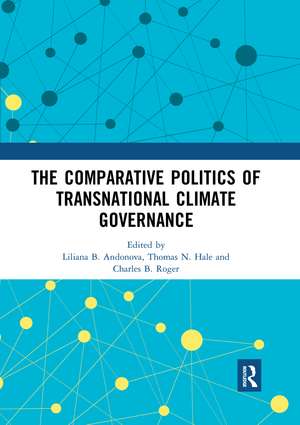The Comparative Politics of Transnational Climate Governance
Editat de Liliana B. Andonova, Thomas N. Hale, Charles B. Rogeren Limba Engleză Paperback – 31 mar 2021
This book was originally published as a special issue of International Interactions.
Preț: 386.81 lei
Nou
Puncte Express: 580
Preț estimativ în valută:
74.02€ • 80.65$ • 62.37£
74.02€ • 80.65$ • 62.37£
Carte tipărită la comandă
Livrare economică 23 aprilie-07 mai
Preluare comenzi: 021 569.72.76
Specificații
ISBN-13: 9780367530617
ISBN-10: 0367530619
Pagini: 212
Dimensiuni: 174 x 246 x 17 mm
Greutate: 0.39 kg
Ediția:1
Editura: Taylor & Francis
Colecția Routledge
Locul publicării:Oxford, United Kingdom
ISBN-10: 0367530619
Pagini: 212
Dimensiuni: 174 x 246 x 17 mm
Greutate: 0.39 kg
Ediția:1
Editura: Taylor & Francis
Colecția Routledge
Locul publicării:Oxford, United Kingdom
Public țintă
Postgraduate and UndergraduateCuprins
1. The Comparative Politics of Transnational Climate Governance Charles Roger, Thomas Hale, and Liliana Andonova 2. Join the Club: How the Domestic NGO Sector Induces Participation in the Covenant of Mayors Program Nives Dolšak and Aseem Prakash 3. Transnational Climate Governance and the Global 500: Examining Private Actor Participation by Firm-Level Factors and Dynamics Lily Hsueh 4. Transnational Climate Governance Networks and Domestic Regulatory Action Xun Cao and Hugh Ward 5. Blurred Lines: Public-Private Interactions in Carbon Regulations Jessica F. Green 6. Transnational Climate Governance Initiatives: Designed for Effective Climate Change Mitigation? Katharina Michaelowa and Axel Michaelowa 7. Domestic Sources of Transnational Climate Governance Miles Kahler
Notă biografică
Liliana B. Andonova is Professor of International Relations at the Graduate Institute of International and Development Studies, Geneva, Switzerland. Her research focuses on international institutions, transnational governance, public-private partnerships, European integration, and environmental cooperation. Andonova is the author of Governance Entrepreneurs: International Organizations and the Rise of Public-Private Partnerships, Transnational Politics of the Environment, and co-author of Transnational Climate Change Governance.
Thomas N. Hale is Associate Professor at the Blavatnik School of Government at the University of Oxford, UK. His research seeks to explain how political institutions evolve—or not—to face the challenges of globalization. His books include Beyond Gridlock, Between Interests and Law: The Politics of Transnational Commercial Disputes and Transnational Climate Change Governance.
Charles B. Roger is a SSHRC Postdoctoral Fellow in the Department of Political Science at the University of Toronto, Canada. His research focuses on processes of informal and transnational governance, and global environmental politics. He is a co-author of Transnational Climate Change Governance and co-editor of Global Governance at Risk.
Thomas N. Hale is Associate Professor at the Blavatnik School of Government at the University of Oxford, UK. His research seeks to explain how political institutions evolve—or not—to face the challenges of globalization. His books include Beyond Gridlock, Between Interests and Law: The Politics of Transnational Commercial Disputes and Transnational Climate Change Governance.
Charles B. Roger is a SSHRC Postdoctoral Fellow in the Department of Political Science at the University of Toronto, Canada. His research focuses on processes of informal and transnational governance, and global environmental politics. He is a co-author of Transnational Climate Change Governance and co-editor of Global Governance at Risk.
Descriere
This book explores the ways in which social forces, private incentives and state policies shape the engagement of businesses, municipalities and other non-state actors in transnational initiatives. The chapters originally published as a special issue in International Interactions.
